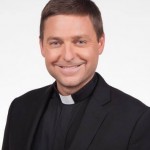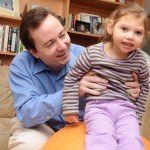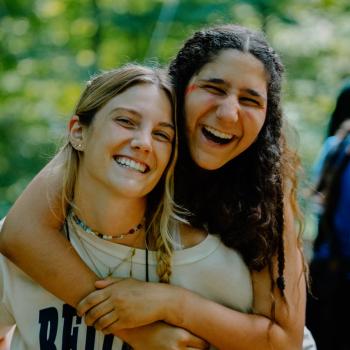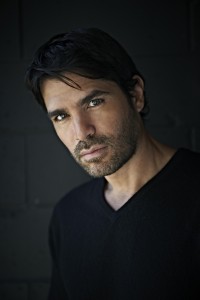 Eduardo Verastegui was a popular singer and telenovela star in his native Mexico when he came to Hollywood looking to build a career in the States as well. But when he reconnected with his Catholic faith during that time, he decided to focus his energies on projects that gave greater glory to God – projects like the movie “Bella,” which he is best known for.
Eduardo Verastegui was a popular singer and telenovela star in his native Mexico when he came to Hollywood looking to build a career in the States as well. But when he reconnected with his Catholic faith during that time, he decided to focus his energies on projects that gave greater glory to God – projects like the movie “Bella,” which he is best known for.
Now, Eduardo has executive produced and co-starred in a new World War Two period drama called “Little Boy.” It’s about a young boy who believes that if he has faith the size of a mustard seed, he can bring his father home from fighting in the Pacific.
The film, with exquisite cinematography designed to look like Norman Rockwell paintings, also deals with the topics of bullying, prejudice, the Corporal Works of Mercy, and the friendship between a Catholic priest and a non-believer.
I recently interviewed Eduardo about the movie, which opens nationwide on April 24th. Here are excerpts from our conversation. You can listen to the whole interview by clicking on the podcast link at the end.
Tony Rossi: You’re an executive producer and co-star of this new film “Little Boy. What was it about the story that you connected with?
Eduardo Verastegui: When Alejandro Monteverde and Pepe Portillo came to me with the script, I was very moved and touched because it’s an American story with a universal message that was going to be made by Mexicans in Mexico. This whole combination was very unique to me. As an immigrant, I’m grateful to this country for opening the door to my dreams. This nation has been such an amazing blessing in my life. To do this movie is a gift to America and the world…because [it] somehow captures the heart and soul of America.
At the same time, it’s a movie for everyone. It’s a fairy tale for adults through the eyes of a little boy who, even though he’s eight-years-old, looks like he’s four. He’s the underdog, and I have been an underdog my whole life. I’m from a small town [in Mexico], just like the little boy in the movie is from a small town in California. When I started going to school, I was only five years old so everyone else was bigger than me and older than me. I was always running and afraid because of bullying, just like Little Boy is bullied [in the movie]. My father was my only friend. He’s my partner, my best friend, just like Little Boy in the movie. So all that touched my heart in a very profound way.
TR: One of the things I like about the movie is that there are Catholic elements to it, but they’re not preachy. They occur naturally in the story, like the inclusion of the Corporal Works of Mercy. As a Catholic yourself – and you play a priest in the movie – how did you approach the portrayal of faith in “Little Boy?”
Eduardo Verastegui: It was important for us to make [the movie] a family experience where everyone can come see it, regardless of where they’re from, what language they speak, what faith they profess. It’s got a universal message. It’s about using your talents to do the right things. It’s about forgiving people, it’s about loving people. It’s a love story between a father and a son. Little Boy [wants] to save the life of his father. I think we all can relate to that.
And the Corporal Works of Mercy is a universal list of things to do. Feed the hungry, visit those who are in prison, visit the sick – this is something that we all should be doing. If we do Little Boy’s list, which are the Corporal Works of Mercy, I guarantee you that we would make this world a better place.
TR: One of the other things I liked about the story is the character Hashimoto. He’s a non-believer who’s friends with Father Oliver, the local priest. A lot of times in the world today, I think people who believe differently can often demonize each other. But here you’ve created this beautiful friendship based on mutual respect. What kinds of lessons do you think viewers can draw from this?
Eduardo Verastegui: I believe that art has the power to heal and bring people together. Right now, we are living in a world that is very divided with a lot of violence and war and pain and sadness and depression. We’re all suffering from that. There’s a lot of fear. My hope as a filmmaker is to bring people together. That’s why the character of Hashimoto has a different belief system than Father Oliver, but nonetheless they respect each other, they love each other, they help each other. I think that’s a profound message because there’s more that unites us than what divides us. Sometimes we focus on what divides us…[but] I think we can start focusing on the things we agree on – and the rest, let’s still have that dialogue with respect, charity and humility.
That’s why I wanted to make a movie about all the problems that we are facing right now in the world, but through the eyes of a little boy. Why a child? Because in the world of children, there is no war out there. Something happens to us when we grow up. We lose that innocence and purity and the capacity to love big and dream big and forgive big. The worst of the worst comes from inside of us and we end up destroying ourselves and we become our own worst enemies. So we need to become little boys and little girls. This movie is a sign to wake up that little boy that we all have in our hearts because when we grow up it falls asleep.
TR: You mentioned art before and how you define it. Has your idea of what art is supposed to do changed since you first entered show business as an actor and singer?
Eduardo Verastegui: I moved to Los Angeles 13 years ago. When I moved here, that’s when I realized how much media influences the way people think. I was not assuming the responsibility that I had to assume. I was using my talents in a selfish way. So instead of using art to make a difference, I was using art to serve myself.
[That changed after] a powerful conversation I had with my English teacher. She’s the one who opened my eyes and challenged me in my career. She asked me, ‘Are you part of the problem or part of the solution?’ She started asking me a lot of questions about my career: ‘why are you an actor? How are you using your talent? Does every project you’re involved with have the power to make a difference and elevate human dignity?’ Little by little, she opened my eyes. Because of her, one day I made a promise to God and to my parents that I would never use my talents to do anything that would offend my faith, my family, and my Latino culture. After that promise, I ended up not working for four years because every single offer that I got was exactly about the things I promised I would never do.
One day I was tired of waiting for a role that would portray a real man, a hero – not like Superman or Spider-Man, but the everyday hero. That’s when I was led to open a production company so I could have the power to control the message and the content so we can produce films that have the potential not only to entertain but to make a difference in people’s lives. When people leave the theater [after seeing “Little Boy”], [I hope] they will leave not only entertained, but inspired to love more and hate less, to forgive more and complain less, to have a feeling in their heart to become the best version of themselves. I believe with art we can achieve that goal.
Plato said that if you have to choose between art and politics to govern a nation, he would choose art because art has the power to touch hearts, change hearts, change how people think and live and behave. He said if you want me to tell you the morality of your country, let me hear their music and I will tell you who they are. It’s true! Oh my gosh, we have a lot of work to do.
TR: So it sounds like the theme of “Little Boy, which is having a mustard seed of faith, you needed that mustard seed yourself years ago. Has it blossomed for you, that mustard seed?
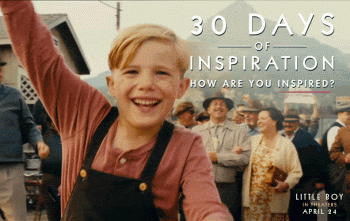 Eduardo Verastegui: I need it always. The journey is not over yet. Just like Little Boy in the movie, he heard that if he has faith the size of a mustard seed, he can move a mountain. We ourselves, the filmmakers, had to move many mountains to get this movie made…As an independent filmmaker, raising one penny is a challenge. But that’s when you have to believe in something bigger than yourself and have faith. It helps so much because it motivates me to keep working.
Eduardo Verastegui: I need it always. The journey is not over yet. Just like Little Boy in the movie, he heard that if he has faith the size of a mustard seed, he can move a mountain. We ourselves, the filmmakers, had to move many mountains to get this movie made…As an independent filmmaker, raising one penny is a challenge. But that’s when you have to believe in something bigger than yourself and have faith. It helps so much because it motivates me to keep working.
When you’re an independent filmmaker, you have to move many mountains every day. What I mean by mountains, for those who haven’t seen the movie yet, it’s symbolism of a dream that hasn’t come true, it could be a problem that you’re facing, or whatever it is that you’re about to give up on and you’re losing hope. The whole idea of this movie is to never lose hope. Believe with all your heart and soul and, if it’s God’s will, it’s going to happen. But never, never give up.
I’m in that business of never give up. Keep fighting till the end. Do everything you can, always with integrity and respect and trying to do your best. That’s my goal: to become the best version of myself. It’s an every day journey, and it doesn’t end until you die. It’s everyday work and an everyday fight. But the symbolism [shows] that faith has to be the center of your life and it’s a gift from God. It’s the most important part of my life.
(Photo credits: 1) Eduardo publicity shot by Nina Duncan, 2) “Little Boy” pic courtesy Metanoia Films)

